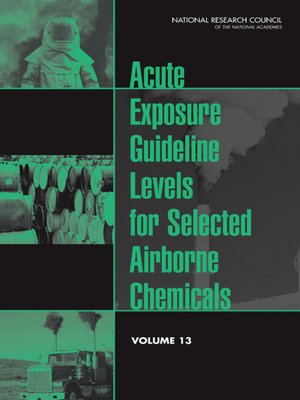Acute Exposure Guideline Levels for Selected Airborne Chemicals, Volume 13
ebook
By National Research Council

Sign up to save your library
With an OverDrive account, you can save your favorite libraries for at-a-glance information about availability. Find out more about OverDrive accounts.
Find this title in Libby, the library reading app by OverDrive.



Search for a digital library with this title
Title found at these libraries:
| Library Name | Distance |
|---|---|
| Loading... |
At the request of the Department of Defense and the Environmental Protection Agency, the National Research Council has reviewed the relevant scientific literature compiled by an expert panel and established Acute Exposure Guideline Levels (AEGLs) for several chemicals. AEGLs represent exposure levels below which adverse health effects are not likely to occur and are useful in responding to emergencies, such as accidental or intentional chemical releases in community, workplace, transportation, and military settings, and for the remediation of contaminated sites.
Three AEGLs are approved for each chemical, representing exposure levels that result in: 1) notable but reversible discomfort; 2) long-lasting health effects; and 3) life-threatening health impacts. Acute Exposure Guideline Levels for Selected Airborne Chemicals: Volume 13 includes AEGLs for boron trifluoride, bromoacetone, chloroacetone, hexafluoroacetone, perchloryl fluoride, piperidine, propargyl alcohol, trimethoxysilane and tetramethoxysilane, and trimethylbenzenes.







